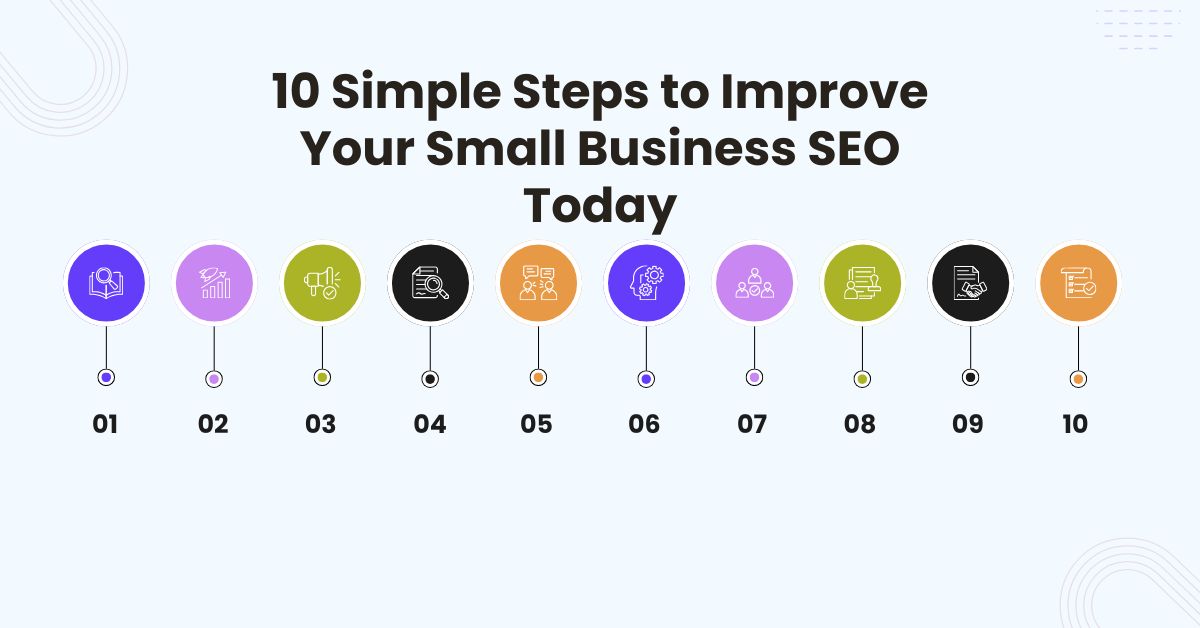10 Simple Steps to Improve Your Small Business SEO Today
Improving your small business’s search engine optimization (SEO) can significantly enhance online visibility, attract more customers, and drive growth. Here are ten practical steps you can implement immediately to boost your rankings without breaking the bank.
Claim and Optimise Your Google Business Profile
A Google Business Profile is essential for small businesses targeting local customers. Ensure your profile includes accurate business information such as name, address, phone number (NAP), operating hours, and website URL. Add high-quality photos and a concise, engaging description of your services or products. Encourage happy customers to leave reviews, as positive feedback can improve your local search rankings and build trust with potential clients.
Perform Keyword Research
Keyword research helps you identify the search terms potential customers use to find your products or services. Use tools like Google Keyword Planner or SEMrush to uncover relevant long-tail keywords with low competition. Integrate these terms naturally into your website’s meta titles, descriptions, headers, and content. Avoid overstuffing keywords, as this can hurt your SEO. Focus on providing content that aligns with user intent to drive better engagement.
Optimise Your Website’s On-Page Elements
On-page SEO plays a vital role in improving your search visibility. Start by crafting compelling meta titles and descriptions that include your target keywords. Use descriptive alt text for images to help search engines understand your content. Implement clear heading structures (H1, H2, H3) to enhance readability. Ensure your site’s URL structure is clean and concise, making it easier for users and search engines to navigate your site.
Focus on Internal Link Optimisation
Internal linking is a simple yet powerful way to improve your site’s SEO. Linking related pages helps search engines understand your website’s structure and distributes link equity effectively. For example, getting help by hiring a specialist that offers an internal link optimisation service can guide users to valuable content while improving overall rankings. Use descriptive anchor texts to make navigation intuitive for visitors.
Create High-Quality Content
Producing valuable, informative content tailored to your audience is critical for SEO success. Write blog posts, how-to guides, and case studies that address common questions or pain points your customers face. Focus on quality over quantity to build authority and trust. For example, a blog on local SEO tips for your industry can position your business as a helpful resource, encouraging repeat visits and customer loyalty.
Improve Website Speed
Page load speed is a key factor in SEO and user experience. A slow website can lead to higher bounce rates and lower rankings. Use tools like Google PageSpeed Insights to identify issues affecting your site’s performance. Compress images, enable browser caching, and minimise JavaScript and CSS files to ensure faster load times. A faster website improves both user satisfaction and search engine rankings.
Make Your Site Mobile-Friendly
With the majority of online searches now conducted on mobile devices, having a mobile-friendly website is essential. Use responsive design to ensure your site looks and functions well on all screen sizes. Test your site’s mobile usability with Google’s Mobile-Friendly Test tool. A mobile-optimised website not only improves rankings but also enhances user experience.
Leverage Local Directories
Listing your business in reputable online directories can improve your local SEO. Ensure consistent NAP details across all platforms, including Yelp, Yellow Pages, and local chamber of commerce websites. Each listing acts as a citation, signalling your business’s legitimacy to search engines. Local directory links also make it easier for customers to discover your business.
Build Backlinks from Trusted Sources
Backlinks are an important ranking factor that signals your site’s authority and trustworthiness. Focus on earning links from high-quality websites in your industry. Collaborate with local businesses, contribute guest posts to relevant blogs, or sponsor community events to gain valuable backlinks. For more guidance, check out this article on hiring a local SEO consultant, which provides insights into effective backlink strategies.
Monitor and Adjust Your Strategy
SEO is an ongoing process that requires regular monitoring and adjustments. Use analytics tools like Google Analytics and Google Search Console to track your website’s performance. Identify which strategies are working and refine those that aren’t delivering results. Regularly updating your content and staying informed about algorithm changes will help you maintain your competitive edge.
Conclusion
Improving your small business SEO doesn’t have to be overwhelming. By claiming your Google Business Profile, performing keyword research, optimising on-page elements, focusing on internal links, creating high-quality content, improving website speed, ensuring mobile-friendliness, leveraging local directories, building backlinks, and monitoring your progress, you can achieve significant results. Implement these ten steps today to increase your visibility, attract more customers, and grow your business online.





